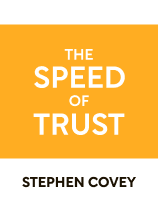

This article is an excerpt from the Shortform book guide to "The Speed of Trust" by Stephen M. R. Covey. Shortform has the world's best summaries and analyses of books you should be reading.
Like this article? Sign up for a free trial here .
Why is trust important in life? Why does society undervalue trust when measuring success?
Former CEO Stephen Covey wrote The Speed of Trust to bring awareness to the value of fostering trust in all relationships. Covey explains how earning more trust leads to career and personal success. According to Covey, the reason why trust is important in life comes from trust’s far-reaching impact on your success, and sometimes it’s not so easy to recognize the effects.
Keep reading to find out why trust is important in life, according to Stephen Covey’s explanation.
Why Trust Matters
In The Speed of Trust, Stephen M.R. Covey explains why trust is important in life, including in every personal and professional relationship, and lays out a roadmap for building and leveraging trust for success. His experience as the co-founder of the FranklinCovey Global Speed of Trust Practice and CoveyLink, and as the former CEO of The Stephen R. Covey Leadership Center, lends a career-worth of credibility to his arguments. This Washington Post, New York Times, and Wall Street Journal bestseller is accessible and actionable enough that readers can start building trust in their own lives today.
Trust is a critical yet undervalued prerequisite for success in the modern world. Covey believes the reason why trust is important in life is its ability to deepen relationships, create opportunities, and improve the efficiency of interpersonal interactions. In The Speed of Trust, Stephen M.R. Covey argues that you’ll be more successful in your personal and professional life when you make trust a top priority.
Covey is an expert on trust. He co-founded the FranklinCovey Global Speed of Trust Practice and CoveyLink, which offers educational materials, training, and public speaking events to individuals and organizations looking to maximize their performance by building and leveraging trust. Before co-founding these businesses, Covey was the successful CEO of The Stephen R. Covey Leadership Center at Utah State University.
The Speed of Trust is a Washington Post, New York Times, and Wall Street Journal best seller that has sold over two million copies in 22 languages since its initial publication in 2006. Covey is also the author of Smart Trust (2012) and Trust & Inspire (2022). In The Speed of Trust, Covey explores why trust is important in life through market research, testimonials from business and industry leaders, and insightful anecdotes from his personal and professional life.
Trust and Value
Covey says the reason why trust is important in life is because trust sets the tone of every interpersonal interaction. Therefore, it dictates how much your assets are worth in real-world situations, regardless of their worth “on paper.” For example, say you are moving and need to sell your cherished family home. A prospective buyer offers to buy the house in cash for well over the asking price, with no inspections. She says she loves the home and will “take good care of it.” On paper, this is a no-brainer. But you know that this buyer has a history of purchasing investment properties and tearing down existing homes to build expensive vacation rentals. Her lucrative offer on paper might be worthless to you because you don’t trust her intentions for your home.
| Trust Gives Money Its Value Trust doesn’t just modify the value of our money in real-world interactions: It is the reason money has value in the first place. Society’s collective trust in the value of money is why we feel comfortable trading goods and services for an intangible currency that mainly exists as digital data. For example, a farmer feels comfortable selling her grain, which has inherent value because it can nourish her and her family, for a digital deposit into her checking account that has no inherent value outside our economic system. She feels comfortable because she expects that she will be able to trade that “useless” digital data for other goods and services, like payments on her property. The only reason this system works is that we all buy into the idea that something with no inherent value is valuable, and we trust that we will be able to turn money into the things we need in the future. |
Leveraging Trust
Now that we’ve discussed why trust is important in life, we’ll cover the benefits you can expect from high-trust relationships.
Covey explains that the benefits of trust begin within you and radiate outwards. He calls this effect the “waves of trust.” We’ll provide a brief explanation of his five waves of trust:
- Self-Trust: If you want other people to trust you, you first need to trust yourself. Essentially, self-trust comes from behaving in a way that reflects your values.
- Interpersonal Trust: Once you’ve worked on the four building blocks of trust within yourself, the harmony between your nature and your proficiency will be clear to those around you. If you’re a trustworthy person, you consistently demonstrate your values, and people notice. This consistency builds trust because people know what to expect from you.
- Team Trust: Groups of people—such as families, school classes, businesses, and so on—function best when trust is high between members. Covey notes that too often, people only think about the importance of team trust when they notice the symptoms of its absence.
- Reputation: The reputation wave encompasses the way your organization is viewed by the rest of the world.
- Collective Trust: Trust is integral to a functioning society, claims Covey. Yet modern society is changing so quickly that knowing when and how to extend trust can be difficult. Therefore, people gravitate towards organizations and individuals that demonstrate their trustworthiness.

———End of Preview———
Like what you just read? Read the rest of the world's best book summary and analysis of Stephen M. R. Covey's "The Speed of Trust" at Shortform .
Here's what you'll find in our full The Speed of Trust summary :
- Why trust is the ultimate key to success
- A roadmap for building and leveraging trust
- An explanation of Steven Covey's “four cores of credibility”






